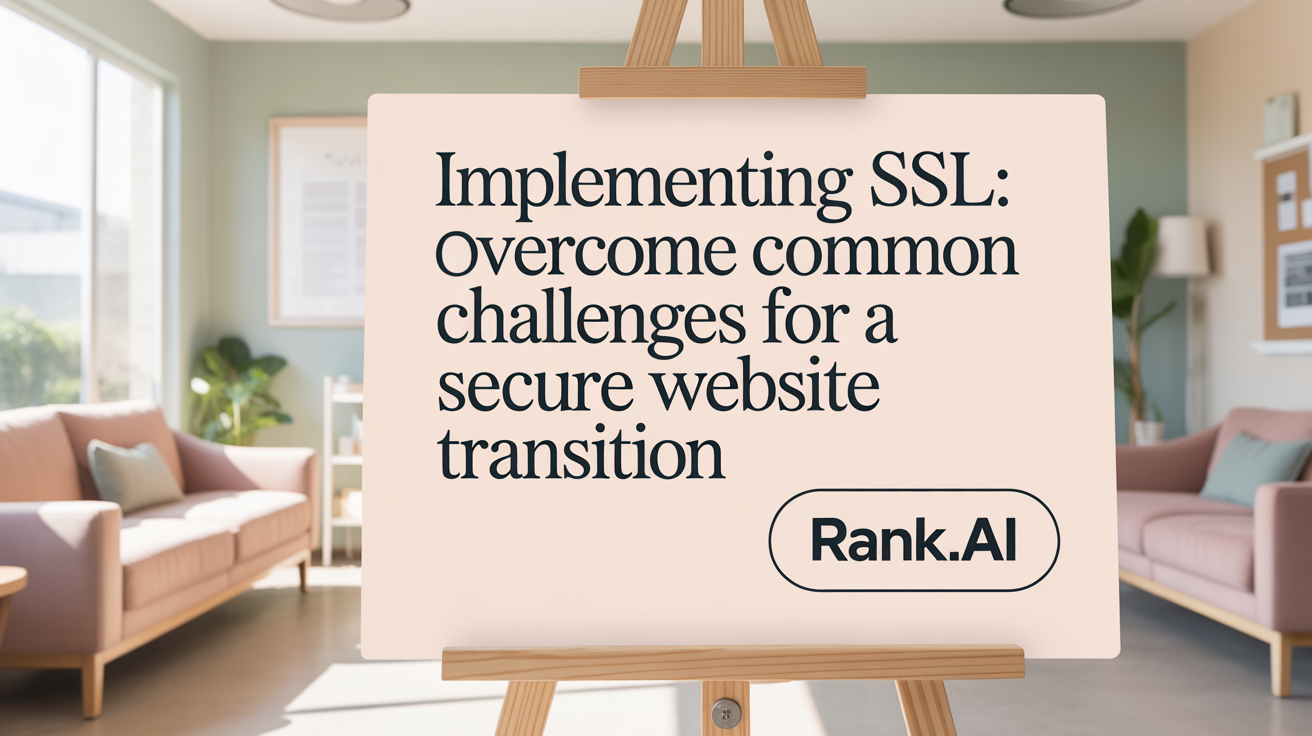Why SSL Certificates and Site Security Affect Rankings
Understanding the SEO Impact of SSL Certificates and Website Security

The Growing Importance of HTTPS and SSL in Search Rankings
With online security increasingly relevant to both users and search engines, SSL certificates and HTTPS have emerged as crucial components of SEO strategies. This article explores how site security influences search engine rankings, user trust, and overall website visibility, revealing why securing your website is no longer optional but essential for SEO success.
Why SSL Certificates and HTTPS Matter for SEO Rankings
What is the significance of SSL certificates and HTTPS for SEO rankings?
SSL certificates and HTTPS play a vital role in modern SEO strategies. Google has explicitly recognized HTTPS as a ranking factor since 2014, which means secure sites tend to rank higher in search results. When a website uses HTTPS, it encrypts data exchanged between the server and visitors’ browsers, ensuring security and privacy.
This encryption reassures users that their sensitive information, such as passwords or credit card details, is protected from hackers and cyber threats. As a result, websites with SSL certificates often enjoy increased user trust and engagement.
Moreover, implementing HTTPS helps prevent security warnings that browsers like Google Chrome display for unsecured sites. These warnings can scare users away, increasing bounce rates and negatively affecting rankings. In fact, studies have shown that switching from HTTP to HTTPS can lead to a noticeable boost in search visibility and traffic.
Properly migrating from HTTP to HTTPS involves technical steps like obtaining an SSL certificate, configuring redirects, updating internal links, and verifying the setup in tools like Google Search Console. When done correctly, this transition preserves existing rankings and can even enhance them.
Google's emphasis on web security aligns with its goal to deliver safe browsing experiences. Websites that prioritize security through HTTPS and ensure proper implementation are favored in search algorithms, leading to better rankings and increased organic traffic.
In summary, SSL certificates and HTTPS are crucial not only for safeguarding data but also for improving search engine positioning. They build user trust, enhance website credibility, and support a positive user experience—all of which contribute to higher visibility in search results.
How do HTTPS and SSL benefit overall website security?
HTTPS, secured by SSL certificates, encrypts all data transmitted between a user’s browser and the server, defending against man-in-the-middle attacks and eavesdropping. This level of security is especially important on public Wi-Fi networks and eCommerce sites handling sensitive information.
SSL certificates authenticate the identity of a website, ensuring visitors are communicating with the genuine site and not an imposter. They also help prevent data tampering, maintaining data integrity.
Incorporating these security measures can decrease the likelihood of security breaches, reduce downtime caused by hacking, and prevent blacklisting due to malicious activity. Search engines also evaluate these factors, giving preference to secure sites.
Technical steps to implement HTTPS
Implementing HTTPS involves several technical steps:
- Obtain an SSL/TLS certificate from a trusted Certificate Authority.
- Install the certificate on the web server.
- Configure your server to use HTTPS by updating settings.
- Set up 301 redirects from HTTP to HTTPS to preserve SEO rankings.
- Update all internal links to use HTTPS URLs.
- Verify the HTTPS setup via tools like Google Search Console.
- Regularly monitor and renew your SSL certificates.
Following these steps ensures a smooth transition that maintains, or even boosts, your current search rankings.
Preserving rankings through proper HTTPS migration
A common concern during migration to HTTPS is losing existing SEO momentum. To prevent this, implement proper redirects and update internal links to explicitly point to the new secure URLs. Use canonical tags and notify search engines through Search Console.
A controlled migration minimizes crawling errors and preserves link equity. A study by SEO agencies indicates that sites switching to HTTPS often see a ranking lift, provided the transition is executed correctly.
Google’s emphasis on site security in algorithms
Google's ongoing algorithm updates reflect its priority for user security. The search giant increasingly favors websites utilizing HTTPS, and Chrome’s security warnings for insecure sites serve as a deterrent.
Furthermore, HTTPS supports performance improvements like HTTP/2, which can lead to faster load times—another ranking factor. As mobile browsing grows, security on mobile sites is also crucial, making HTTPS an integral part of mobile SEO.
In essence, secure websites are likely to perform better in search results, offering a safer experience that aligns with Google’s core mission to prioritize user safety and trust.
How SSL Certificates Enhance User Trust, Engagement, and Conversions

How do SSL certificates influence user trust, engagement, and conversions related to SEO?
SSL certificates play a crucial role in building online trust. When visitors see security indicators like a padlock icon or the 'https://' prefix in their browser address bar, they immediately recognize the site as secure. This visual affirmation reassures them that their data—for example, personal details or credit card information—is protected.
Such trust signals encourage users to stay longer on the website and explore its content more confidently. They are more likely to engage with the site, share content, or complete transactions. This increased engagement not only benefits user experience but also leads to higher conversion rates, especially for eCommerce platforms.
Search engines like Google also factor in HTTPS as a ranking signal. Therefore, SSL certificates can indirectly elevate a site’s visibility in search results. Studies indicate that switching to HTTPS not only improves rankings but also positively influences user behavior, such as reducing bounce rates and increasing the time spent on a website.
Additionally, HTTPS supports website performance improvements via protocols like HTTP/2, which load pages faster—another element that can increase user satisfaction and SEO performance. Overall, SSL certificates help create a trustworthy, secure browsing environment that drives user engagement, boosts SEO, and enhances conversions.
Understanding SSL Certificates: Types and Their SEO Implications

What are the different types of SSL certificates and how do they differ?
SSL certificates come in three main types: Domain Validation (DV), Organization Validation (OV), and Extended Validation (EV). Each provides a different level of trust and assurance for website visitors.
- Domain Validation (DV): This is the most basic SSL certificate. It verifies the ownership of the domain name. Websites with DV certificates simply show the padlock icon, indicating secure connection.
- Organization Validation (OV): This level includes verification of the organization behind the website, ensuring that it’s a legitimate business. OV certificates display additional details in the certificate, providing higher user confidence.
- Extended Validation (EV): The highest level of certification, EV certificates undergo rigorous vetting of the organization. They trigger the browser’s address bar to display the company name, greatly increasing user trust.
How does validation level impact user trust and SEO?
The validation process influences how users perceive the trustworthiness of a website. Higher validation levels (OV and EV) assure visitors that the website is legitimate and secure, which can bolster user confidence.
From an SEO perspective, while all SSL certificates enhance security and signaling to Google, sites with EV certificates are often perceived as more trustworthy. This trust can translate to increased engagement, lower bounce rates, and potentially higher rankings.
How to choose the right SSL certificate for your website?
Selecting the appropriate SSL certificate depends on your website’s needs and the level of trust you wish to convey.
Certificate Type Best For Trust Level Cost & Complexity DV Personal blogs, small websites Basic security Low cost, easy to obtain OV Business websites Medium trust, business validation Moderate cost, moderate validation EV E-commerce, banking, large organizations Highest trust, branding Higher cost, extensive validation
Choosing the right certificate aligns with your site’s purpose and your users’ expectations.
How SSL certificates support SEO and why they matter
SSL certificates are not just about encrypting data—they also serve as an authentication tool that verifies your website’s identity. Search engines like Google recognize the presence of an SSL certificate as a trust signal, often favoring HTTPS sites in rankings.
Having a valid SSL certificate can lead to better search visibility and improved user trust, which positively impacts SEO. Additionally, secure sites tend to have lower bounce rates and higher engagement, further benefiting search rankings.
In conclusion, understanding the different types of SSL certificates and selecting the appropriate one is crucial. It enhances security, builds credibility with visitors, and can provide an SEO advantage, making it an essential consideration in your website’s security and optimization strategy.
The Technical Mechanics Behind SSL and HTTPS for SEO Benefits

How SSL encrypts data via public/private key pairs
SSL (Secure Sockets Layer) uses a system of public and private keys to secure communication between a website and a user's browser. When a user visits a website secured with SSL, the server sends its public key to the browser. The browser then uses this key to create a unique session key for that connection. This session key encrypts all subsequent data exchanged, ensuring privacy.
Establishing secure connections with SSL/TLS protocols
SSL uses the TLS (Transport Layer Security) protocol to establish a secure, encrypted connection. During the initial handshake, the server and browser agree on encryption algorithms and exchange cryptographic parameters. Once a secure connection is established, data sharing becomes encrypted, preventing eavesdropping and tampering.
Preventing man-in-the-middle and data breach attacks
SSL certificates verify the website's identity, establishing trust. Without proper verification, hackers can attempt man-in-the-middle attacks, intercepting sensitive data. SSL encrypts data in transit, making it unreadable to attackers. Proper implementation, including obtaining a valid SSL certificate, helps safeguard valuable data from breaches.
Benefits of HTTPS such as HTTP/2 enabling faster site speeds
Switching to HTTPS enables modern features like HTTP/2, which allows multiple requests and responses to be multiplexed over a single connection. This reduces latency, accelerates page load times, and enhances user experience—factors that positively influence SEO rankings.
Preserving referral data and accurate analytics tracking
When traffic passes from HTTPS to HTTP sites, referral data can be lost, impacting analytics accuracy. HTTPS maintains the integrity of referral information, allowing website owners to better analyze traffic sources. This accurate data is crucial for measuring effectiveness and optimizing SEO strategies.
Search Engines Prioritizing Website Security in Ranking Algorithms
Historical introduction of HTTPS as a ranking signal by Google
Google officially announced in 2014 that HTTPS, secured by SSL certificates, would be considered a ranking factor. Initially, this influence was minor, affecting less than 1% of search results, but over time, its importance has grown. Google's goal was to promote a safer web environment by incentivizing website owners to adopt secure HTTPS connections. Studies, such as those by Brian Dean and Moz, have shown a moderate correlation between HTTPS and higher search rankings, confirming that security is now a significant aspect of SEO.
The weight of security compared to other SEO factors
While HTTPS is a helpful ranking signal, it's just one element in a complex SEO landscape. Implementing SSL certificates can lead to higher positions in search results, mainly when competing sites are similar in content and backlinks. According to Google, HTTPS acts as a relatively lightweight boost or a tiebreaker, meaning it can favorably influence rankings when all other factors are equal. This incremental advantage makes security an important, yet not solitary, component of effective SEO strategies.
Google Search Console features exclusive to HTTPS sites
Google Search Console offers vital tools for website owners to monitor SEO performance, many of which are accessible only when a site runs on HTTPS. These include detailed security reports, protocol settings, and site health checks. These features help verify that SSL certificates are properly installed, validate site security, and optimize search presence. Running a secure site not only boosts rankings but also unlocks these analytic benefits, enabling better website management and performance tracking.
Browser security warnings impacting user behavior and SEO
Major browsers like Google Chrome actively flag non-secure websites without SSL certificates. Chrome displays warnings such as 'Not Secure,' which can significantly deter visitors. These security indicators reduce user trust, increase bounce rates, and decrease overall engagement. Consequently, insecure sites may see a decline in traffic and search rankings, as browsers' warnings influence user behavior and perception. Securing a site with SSL can prevent these warnings, maintain visitor confidence, and support SEO efforts.
Security’s role as a tiebreaker in competitive search rankings
In highly competitive niches, SSL certificates can tip the scale between similar sites. Google's algorithms favor secure websites, especially when other ranking factors are balanced. Studies and Google’s own statements emphasize that HTTPS can serve as a subtle yet impactful tiebreaker, helping secure higher positions in search results. This underscores the importance of SSL implementation, not just for trust and security but also as part of a comprehensive approach to outrank competitors.
Common Challenges and Considerations When Implementing SSL

What are the potential disadvantages of implementing SSL certificates?
Implementing SSL certificates offers many security and trust benefits, but it also comes with some challenges.
One of the main concerns is the cost. While basic SSL certificates, like Domain Validation (DV), are often inexpensive or even free, higher assurance certificates such as Extended Validation (EV) can be costly. Additionally, managing multiple certificates or renewing them regularly adds to ongoing expenses and administrative work.
Technical difficulties can also arise during implementation. For example, improper server configuration might lead to mixed content warnings—when a secure HTTPS page loads non-secure elements—which can upset users and lower trust. Redirects must be correctly configured to prevent issues like redirect loops or loss of traffic data.
Performance impacts are another consideration. Secure connections require additional processing power on the server, which can increase latency. HTTPS often uses protocols like HTTP/2, which can boost speed, but proper server support is necessary. Increased server resource usage might impact load times, especially on shared hosting or older hardware.
Maintaining SSL certificates involves routine tasks such as renewal, updates, and monitoring for security vulnerabilities. Failing to renew or properly configure certificates can result in security warnings, loss of trust, and SEO penalties.
In some cases, improper SSL implementation can cause SEO issues. Broken or expired certificates can lead browsers to display warnings, which may detour visitors and harm the site's reputation. Search engines might also interpret such issues as a sign of neglect, potentially lowering rankings.
Understanding these challenges helps website owners plan effectively, balancing security improvements with technical and financial considerations.
The Indirect SEO Benefits of Robust Site Security Beyond SSL
Protection Against Hacking, Spamming, and Blacklisting
Implementing strong security measures helps prevent hacking attempts, spamming, and malicious activities. When a website is compromised, it can lead to content deletion, blacklisting by search engines, or even complete removal from search results. Securing your site reduces these risks, maintaining a consistent presence in search rankings and ensuring your content remains accessible.
Reducing Site Downtime and Content Deletion Risks
Security breaches often lead to website downtime, which hampers search engine crawling and indexing efforts. Downtime can cause search engines to temporarily disqualify or demote your site. Regular updates, security plugins, and strong passwords help keep your website operational, preserving your SEO efforts and visitor engagement.
Mitigating Fake Traffic and Bot Activity
Fake traffic, generated by bots or malicious scripts, can skew your analytics data and harm your SEO strategies. Good security practices include deploying bot management tools and firewalls that filter out non-human traffic, ensuring that your analytics reflect genuine user engagement. This accuracy allows for better optimization and resource allocation.
Improving Crawlability and Indexing by Search Engines
Secure websites tend to experience fewer crawling errors and security warnings, facilitating smoother indexing by search engines. A website free from vulnerabilities invites more frequent crawls and ensures that your latest content and pages are accurately reflected in search results, helping you maintain or boost your rankings.
Integrating Security Plugins, Strong Passwords, and Updates with SEO
Combining SSL implementation with security plugins, regular software updates, and strong password policies creates a comprehensive security environment. This approach not only protects your website from attacks but also aligns with SEO best practices by reducing risks associated with site penalties, ensuring your site remains trustworthy and visible in search rankings.
SSL Certificates as Part of a Holistic SEO Strategy

What are some key factors affecting SEO rankings besides SSL and site security?
While SSL certificates and HTTPS are important for both security and SEO, they are just part of a broader set of factors that influence search engine rankings.
One critical aspect is the relevance and proper use of keywords. Incorporating keywords naturally into title tags, meta descriptions, headers, and images helps search engines understand the content and context of your pages.
Content quality also plays a vital role. High-quality, comprehensive, and original content that showcases expertise and trustworthiness — often summarized as EEAT (Experience, Expertise, Authority, Trust) — earns credibility with users and search engines.
Backlinks from reputable sites serve as endorsements, signaling that your website is credible and valuable. These links are among the most significant ranking signals.
Site architecture and navigation are crucial as well. A well-structured website with clear, logical navigation helps search engines crawl and index pages effectively, while also improving user experience.
Finally, factors like website speed, mobile responsiveness, and overall ease of use directly impact rankings. A fast, mobile-friendly website reduces bounce rates and enhances user engagement, further supporting SEO success.
How does site architecture, keywords, and user experience contribute to SEO?
The architecture of a website determines how easily both users and search engines can find and understand content. Clear menus, logical page hierarchy, and internal linking improve crawlability and page visibility.
Keywords guide the optimization process, helping align content with what users are searching for. Proper placement in key areas increases relevance and ranking chances.
User experience factors like fast load times, mobile adaptability, and a straightforward interface reduce user frustration, encourage longer visits, and lead to higher engagement—factors that positively influence search rankings.
Why is SSL alone insufficient for SEO success?
SSL certificates mainly provide security and build trust; however, SEO success requires a wider approach. Relying solely on HTTPS does not address content relevance, backlinks, or user engagement.
Effective SEO involves a combination of high-quality content, strong backlink profiles, good website structure, and positive user signals.
Without complementary strategies, simply implementing SSL won't significantly improve your search rankings or online visibility.
How can combined SEO and security practices build authority?
Integrating security measures like SSL with traditional SEO tactics creates a robust online presence. Secure sites that also produce valuable, relevant content and earn authoritative links are perceived as trustworthy and credible.
This dual focus not only boosts rankings but also enhances user trust, encouraging repeat visits and conversions.
What are the long-term benefits of integrating SSL with a comprehensive strategy?
Long-term, combining SSL with ongoing SEO efforts leads to sustained visibility, user trust, and higher rankings. Secure websites are better protected against cyber threats, reducing risks of data breaches and reputational damage.
Moreover, search engines prioritize secure, user-friendly sites, so consistent security and SEO optimization foster continuous growth and resilience against algorithm changes.
By adopting a holistic approach—merging security, quality content, technical SEO, and user experience—websites can achieve enduring success in the competitive digital landscape.
The Future Outlook: HTTPS and Site Security in SEO Evolution
How is the increasing use of mobile devices and public Wi-Fi networks affecting the need for HTTPS?
The proliferation of mobile usage and the widespread availability of public Wi-Fi networks have made online security more important than ever. Users accessing websites via public Wi-Fi are vulnerable to data interception and man-in-the-middle attacks. HTTPS encrypts the data exchanged between the user’s device and the website, securing sensitive information such as passwords and payment details. As mobile searches and transactions rise, search engines like Google increasingly favor secure sites, making HTTPS essential for maintaining user trust and ensuring data privacy.
How is Google reinforcing the importance of site security for SEO?
Google has been steadily strengthening its emphasis on website security as a ranking factor. Since 2014, Google's algorithms have regarded HTTPS as a minor ranking signal, with more significant weight added over time. Google's Chrome browser now flags non-HTTPS sites as "Not Secure," which can deter visitors and reduce traffic. Additionally, Google Search Console offers insights and reports exclusively to HTTPS sites, encouraging webmasters to upgrade. This continuous focus signals that secure websites are better positioned to achieve higher rankings.
What is the predicted influence of HTTPS and SSL on search analytics?
The role of HTTPS and SSL certificates in search analytics is expected to grow. Secure sites preserve referral data, allowing for accurate traffic source measurement in analytics tools like Google Analytics. As search engines prioritize security, HTTPS will increasingly serve as a standard for indicating trustworthiness, indirectly affecting metrics like bounce rates, engagement, and conversions. Consequently, websites with proper SSL setup will gain clearer insights into their traffic and effectiveness, helping refine SEO strategies.
Why is ignoring SSL becoming more costly in competitive SEO?
Overlooking SSL can have significant repercussions in competitive markets. Unsecured websites face warnings from browsers, which can diminish user confidence and increase bounce rates. Search engines may penalize insecure sites, lowering their visibility amidst competitors who secure their platforms. Moreover, non-secure sites risk losing referral traffic and face trust issues, especially in eCommerce or sensitive data exchange contexts. The cost of neglecting SSL extends beyond rankings, impacting reputation, user engagement, and revenue.
Why should websites maintain up-to-date and flawless HTTPS implementations?
It’s crucial for websites to keep their SSL certificates current and properly configured. Expired or broken certificates trigger security warnings in browsers, undermining trust and deterring visitors. Proper implementation involves installing valid certificates, setting up 301 redirects from HTTP to HTTPS, updating internal links, and verifying configurations regularly. Maintaining a flawless HTTPS setup ensures optimal security, user confidence, and protection against vulnerabilities. As search engines increasingly favor secure sites, flawless HTTPS implementation is vital for ongoing SEO success.
Aspect Impact Additional Details Mobile & Public Wi-Fi Boosts the need for encryption Protects user data on vulnerable networks Google & Security Strengthens search ranking signals Chrome warnings reduce user trust Search Analytics Enhances traffic tracking accuracy Preserves referral data Competitive SEO Offers ranking advantages Non-secure sites face penalties Maintenance Ensures ongoing security & trust Prevents security warnings
As the digital landscape evolves, the trend toward widespread HTTPS adoption underscores its importance in search engine optimization. Staying ahead requires ongoing vigilance in maintaining a secure, trustworthy online presence.
Securing Your Website: A Must for SEO Success
SSL certificates and HTTPS are no longer optional extras but fundamental elements in today’s SEO landscape. They directly influence search rankings by signaling security and trust to search engines like Google while simultaneously boosting user confidence and engagement. While SSL implementation can involve challenges and costs, the benefits — from improving rankings and driving more organic traffic to enhancing conversions and protecting online credibility — far outweigh the drawbacks. Incorporating SSL certificates as part of a broader SEO and security strategy ensures websites not only rank higher but also deliver safer, more trusted user experiences. As search engines tighten their focus on website security, staying ahead by adopting robust SSL practices is crucial for maintaining and enhancing online visibility.
References
- SSL SEO Strategies: How HTTPS Affects Google Rankings
- What Is An SSL & Does It Affect Search Rankings? | little guy branding
- How does an SSL certificate affect search engine rankings?
- SSL Certificate and SEO: What You Need to Know - Alli AI
- The Impact of HTTPS on SEO and Why Your Site Needs It - Mettevo
- How Does Website Security Affect Your SEO Rankings? - CHEQ
- Do SSL Certificates Affect Search Rankings? (A Data Driven Answer...)
Table of contents
Recent articles
Fresh insights on AI and SEO to help you stay ahead of the curve.


Ready to Improve
Your Rankings?
Use our free tools to get instant insights into your SEO performance and discover opportunities to rank higher




